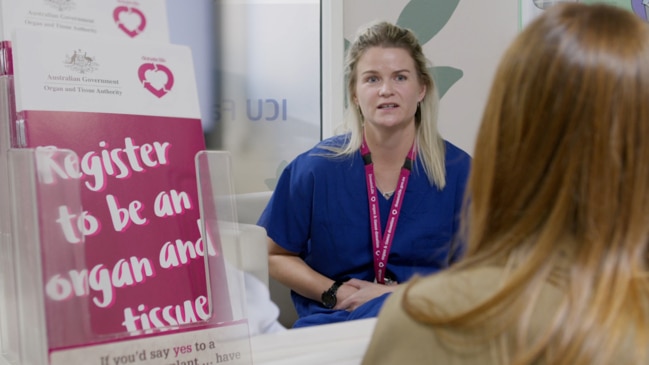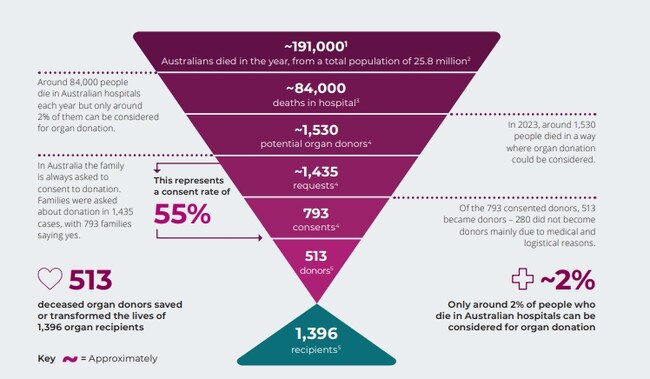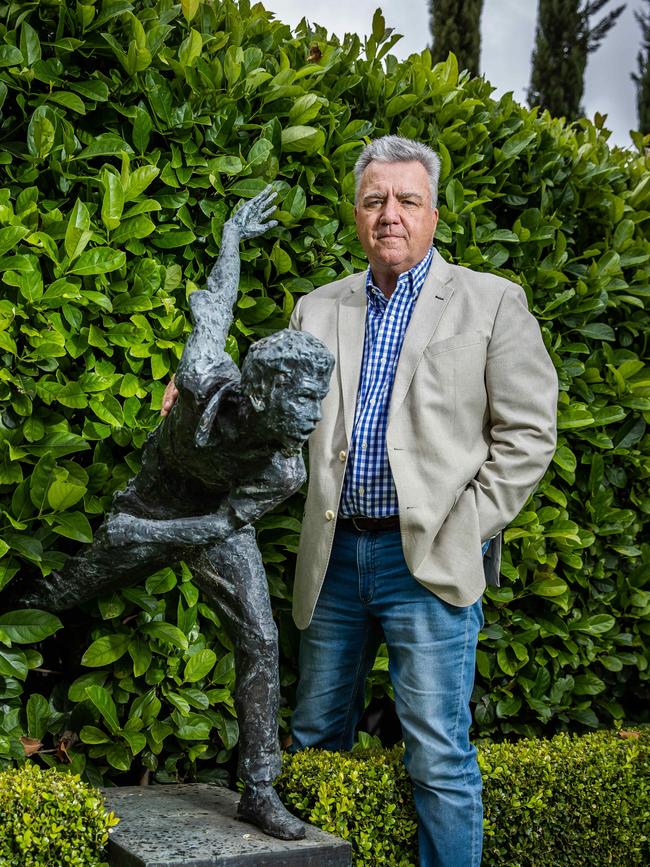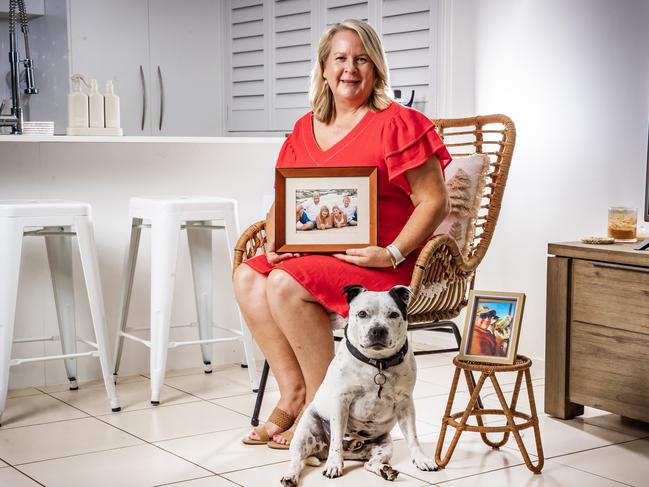Organ donations, transplants rise in Australia – but too many families still saying ‘no’
Brenda Pratt is “proud” her beloved husband, Tony, saved lives as an organ donor – but half of Aussie families aren’t consenting to this. See how your state stacks up.

National
Don't miss out on the headlines from National. Followed categories will be added to My News.
The number of Australians receiving lifesaving organ transplants rocketed up 14 per cent to almost 1400 last year, as donation levels shot back up towards pre-Covid levels.
Also rising was the volume of deceased donors, up 13 per cent annually to 513, the latest Australian Donation and Transplantation Activity Report shows.
But the proportion of families saying ‘yes’ to donation stagnated at 55 per cent. The figure was 59 per cent before the pandemic struck.
Family consent is required for a person to donate their organs and tissue, regardless of whether they are on the Australian Organ Donor Register. But when a person was registered, 80 per cent of families agreed to donation in 2023
Organ and Tissue Authority chief executive Lucinda Barry urged Australians aged 16-plus to “take a minute to register via donatelife.gov.au or the Medicare app, and let their family know that they want to be a donor”.
“A key focus for the OTA is having a donation nurse specialist with families in all conversations about donation,” she added, noting this occurred in 84 per cent of cases in 2023.
“Having a specialist who has the time and the knowledge to answer families’ questions results in more people agreeing to donation.”
The OTA is striving to get Australia’s consent rate back to pre-pandemic levels and then, to 70 per cent, which would mean an additional 300 people receiving organ transplants each year.

Factors including grief from a loved one’s passing and not knowing their wishes, perceived cultural or religious barriers, and misunderstanding the donation process can lead to families saying no to donation. Ms Barry said hospitals also remained under significant pressure.
More encouraging was the fact Australia’s transplantation and donation levels were just 6 per cent behind where they were before Covid.
“We set in place a five-year strategy for recovery, and we’re a bit ahead of where we expected to be,” she said.
“We can’t thank the people who have said ‘yes’ to donation enough.”
Oren Klemich – whose son, Jack, became a donor after he died suddenly from meningococcal at age 18 – echoed the importance of Australians discussing organ donation with their families.


“It was a horrid time for us, we still struggle with it 15 years on,” said Mr Klemich, also an OTA board member. “That decision to say yes was made easier because Jack was registered.
Jack donated five organs to four people, three of whom are still alive.
While Mr Klemich and his wife, Gill, do not know their identities, they recently wrote them letters that were distributed by DonateLife SA. The recipient of Jack’s liver responded.
“He said he only had weeks to live (before the transplant) and he’s now leading a normal and happy life thanks to the liver he received back in 2009,” he said.
“It really was, at the time, a difficult decision. But 15 years on, you get a letter like that, it justifies the decision.
“Our little mate is still out there, keeping Australian people alive.”
Ged Kearney, Assistant Minister for Health and Aged Care, called on all Australians aged 16-plus who are eligible to register as an organ and tissue donor, but haven’t, to do so.
“It’s easy and only takes one minute at donatelife.gov.au or on the Medicare app,” she said.
“In 2023, nearly 1400 lives were saved by the gift of organ donation. On behalf of these people, I would like to profoundly thank all organ donors and their families.”
State-by-state findings:
NSW and Victoria
A nation-topping 47,132 NSW residents registered to become organ donors last year, while the state was home to 392 organ recipients and 142 donors in 2023.
These figures were up from 319 and 122 the year prior.
But only half of NSW families are saying ‘yes’ to their loved ones actually donating when asked.
And less than a quarter of eligible Victorians are registered to become organ donors – the lowest proportion of Australia’s states – despite about 40,500 residents making the lifesaving pledge last year.
Twenty-three per cent of Victorians aged 16-plus are on the Australian Organ Donor Register, well below the national average of 36 per cent and national leader South Australia at 73 per cent, according to the latest Australian Donation and Transplantation Activity Report.
SA is the only jurisdiction nationally where residents can register when applying for or renewing their driver’s licences, which Ms Barry said was a significant booster for the state’s registration rate.
But a parliamentary inquiry aimed at increasing Victoria’s registered organ and tissue donors last year heard VicRoads had not considered whether they should restore organ donation status on driver’s licences.
The report also shows Victoria had 142 deceased donors in 2023, equating to a rate of 20.8 donors per million population that was bettered only by Tasmania (36.7) and South Australia (26.5) nationwide.
Further, 361 people in the state received lifesaving organ transplants. And 54 per cent of families in the state said ‘yes’ to their loved ones becoming donors when asked in 2023 – on par with the national figure, which is down from 59 per cent pre-Covid.
Ms Barry said the OTA was “working hard” to get Victoria and NSW back to pre-Covid levels. She cited the fact the states had more hospitals than other jurisdictions to distribute DonateLife nurses between, and large multicultural communities that, generally speaking, required more education around donation as challenges.
Queensland
Organ donation in Queensland has essentially recovered to pre-Covid levels, with the state’s high consent rate playing a significant part.
The latest figures show 63 per cent of Queensland families are saying yes to their loved ones becoming donors when asked – up from 53 per cent the year prior, and exceeding the national average of 55 per cent.
Almost 35,400 Queenslanders joined Australian Organ Donor Register in 2023.
The state also had 308 transplant recipients and 105 deceased donors. The latter figure was one shy of Queensland’s peak in 2019, and both numbers were up from 204 and 77 in 2022.
“Queensland has shown significant recovery,” Ms Barry said. If you have a high consent rate, you will end up with a higher donation rate – you can see that (in Queensland).”
South Australia
A nation-leading 73 per cent of eligible South Australians have pledged to become organ donors, with 32,399 people adding their names to the register in 2023.
SA residents’ ability to register via their driver’s license is a key contributing factor to the high proportion, with other states and territories not provided with this option.
The state also has the highest proportion of people aged 16-25 on the register, at more than 50 per cent, according to Organ and Tissue Authority chief executive Lucinda Barry.
The Australian Donation and Transplantation Activity Report shows 58 per cent of families in the state said ‘yes’ to their loved ones becoming organ donors when asked – above the national average of 55 per cent.
Tasmania
A nation-leading 83 per cent of Tasmanian families are saying ‘yes’ to their loved ones becoming organ donors when asked.
The report also shows 3632 Tasmanians joined the register in 2023, while the state had 57 transplant recipients and 21 deceased donors.
Ms Barry labelled Tasmania “the standout state for 2023” due to its stellar consent rate.
Northern Territory
Only a quarter of Northern Territory families are saying ‘yes’ to their loved ones becoming organ donors when asked – but the figure has risen from 9 per cent year-on-year.
The Australian Donation and Transplantation Activity Report also shows 1205 Territorians joined the register in 2023.
The NT was also home to eight transplant recipients and three deceased donors – up from two and one respectively in 2022.
Ms Barry said it was pleasing to see the territory’s consent rate more than double, noting that spreading the message about the importance of donation to remote communities was a key focus for the OTA’s DonateLife NT team.
No brainer for “100 per cent giver” to donate

Tony Pratt was “a 100 per cent giver”. So when the opportunity arose for him to save and change lives as an organ and tissue donor after he suffered a fatal stroke, his family all agreed the answer was yes.
“He always said yes to helping people,” said Tony’s childhood sweetheart and wife of three decades, Brenda Pratt. “(Becoming a donor) was his next unselfish act. It really was a no-brainer.
“It doesn’t make our pain any less. But if the roles were reversed and someone could have saved Tony, we would have given anything for it.
“I am proud that Tony could change someone’s life, he was that kinda guy.”
Tony – father to Ebony and Hayden, and grandfather to Harper and Nate – was working on his friend’s farm an hour and a half from the home he shared with Brenda in Pottsville, in northern NSW, when he had a stroke out of the blue.
A few days later, he died age 53 at Gold Coast University Hospital, surrounded by his beloved family, friends and dog, Dodge.
When it became clear Tony wasn’t going to make it, his wife and children were asked whether they would consent to him donating his organs and tissue. They all said yes and he donated his lungs, skin tissue and corneas.
Brenda said she knew her husband’s wishes. They had discussed it several times and a week before his death, she had reminded him to join the Australian Organ Donor Register officially via the Medicare app.
Brenda is adamant talking to your loved ones about organ donation doesn’t have to be dark and depressing. She urged all Australians to make their wishes known.
“I’m a massive advocate for people having the conversation,” she said. “Your loved ones are ultimately making the decision.”
Her other focus is keeping Tony’s memory alive.
“We speak openly about him, laugh about him, cry about him at times,” she said. “He was a wonderful person, an amazing dad, a much-loved brother-in-law, the best Uncle Tone. The more people who say his name, the happier I am.”
MORE: Melbourne mum offers to donate part of her liver to save baby’s life
Organ and tissue donation and registration in Australia explained
Jonathan Brown opens up about losing his mum, saying yes to organ donation
Organ and tissue donation 2023
Australia-wide
-513 deceased organ donors (+13%)
-1396 organ transplant recipients (+14% from 2022)
-1546 deceased eye donors (+5%)
-328 deceased tissue donors (+19%)
-2486 corneal transplant recipients (+6%)
-55% of families consented to donation (+1% from 2022, but -4% from pre-Covid levels)
-80% of families agreed to donation when their family member was registered
-7.7 million Australians aged 16-plus (36% of population) are registered to be donors (+2%)
-2% of people who die in Australian hospitals can be considered for organ donation
State by state
Deceased organ donors / Transplant recipients / Consent rate / New registrations / Registration rate
NSW: 142 / 17.5 / 392 / 50% / 47.1k / 41%
VIC: 142 / 20.8 / 361 / 54% / 40.5k / 23%
QLD: 105 / 19.2 / 308 / 63% / 35.4k / 31%
SA: 49 / 26.5 / 116 / 58% / 32.4k / 73%
WA: 43 / 14.9 / 126 / 53% / 15.6k / 37%
TAS: 21 / 36.7 / 57 / 83% / 3.6k / 48%
ACT: 8 / 11.3 / 28 / 56% / 4k / 27%
NT: 3 / 11.9 / 8 / 25% / 1.2k / 16%
Source: 2023 Australian Donation and Transplantation Activity Report
Originally published as Organ donations, transplants rise in Australia – but too many families still saying ‘no’



